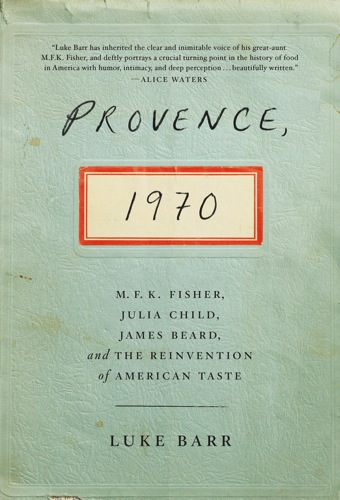(See form below to register to win my copy of Provence 1970)
M.F.K Fisher, Julia Child, James Beard, All names form the food world I had grown up with, but outside of Julia Child, whom I watched on television as a small child, I knew very little about them beyond their names. I knew, vaguely, that they were responsible in a large part for the dramatic changes which happened in American kitchens in my childhood. I have seen their influence push dinnertime staples from Hamburger Helper to the heights (and sometimes, follies) of organic food, farmer’s markets, vegetarianism, veganism and beyond. Still, the people behind these names were beyond me.
Provence, 1970 is about a singular historic moment. In the winter of that year, more or less coincidentally, the iconic culinary figures James Beard, M.F.K. Fisher, Julia Child, Richard Olney, Simone Beck, and Judith Jones found themselves together in the South of France. They cooked and ate, talked and argued, about the future of food in America, the meaning of taste, and the limits of snobbery. Without quite realizing it, they were shaping today’s tastes and culture, the way we eat now. The conversations among this group were chronicled by M.F.K. Fisher in journals and letters—some of which were later discovered by Luke Barr, her great-nephew. In Provence, 1970, he captures this seminal season, set against a stunning backdrop in cinematic scope—complete with gossip, drama, and contemporary relevance. – Amazon.com
Provence 1970(opens a doorway into all of these people, and more, mainly through the diaries of M.F.K Fisher. We get glimpses of a food world that was changing dramatically. All involved sensed that they were at the cusp of even larger changes — breaking away from the specifics of French food brought to America and helping to develop a uniquely American cuisine.
Provence 1970 was an easy and fascinating read. There is an intimacy, a conversational flow and a bit of cattiness that pulled me through the book. Not only was I learning about their culinary history, but also quite a bit about them as people. Here are laid bare the conflicts, the arguments, the pain and the joy that accompany any deep relationship. For someone like myself, who only really saw the end result of these relationships, it was eye-opening and greatly entertaining.
This is no cookbook, although food is always the topic of conversation and the lubricant for philosophizing about human nature and the state of the world. In fact, most of the food discussed is far beyond my knowledge, skills and palate, but it was fascinating all the same. I was especially taken with the burgeoning discussions about simple, slow, authentic food when most of their histories are filled with extravagant, complicated and, in some cases, ostentatious dishes and meals. Even at this early time, they were already seeing a need and desire for a cuisine that is more about creating great food, simply, rather than being burdened with the complexity of the French cuisine that had worked so hard to promote and bring to America.
I highly enjoyed the book and I now feel I have a much better understanding of how we arrived at our current time and place regarding food. Sure, Hamburger Helper and Kraft Macaroni and Cheese still sell in every store, but we now have a host of alternatives, if we only take the time to look — and enjoy — them. I think it can be said that all the amazing food we have today — farmer’s markets, high-end restaurants, home-milled grains and baked breads, organic foods and more — all stem from this time and this relatively small collection of people, gathering that Winter in Provence.
This book was provided for free by Blogging for Books. The opinions of this review are my own.
***
Win my copy of Provence 1970 by Luke Barr.
Share your favorite recipe with me and my readers. I’ll be posting my favorite recipes from your links in the coming weeks.
You can also Twitter your recipe links to @douglaswelch to enter.
Use this form to enter. US/Canada Only, please. Winner selected March 1, 2015.



